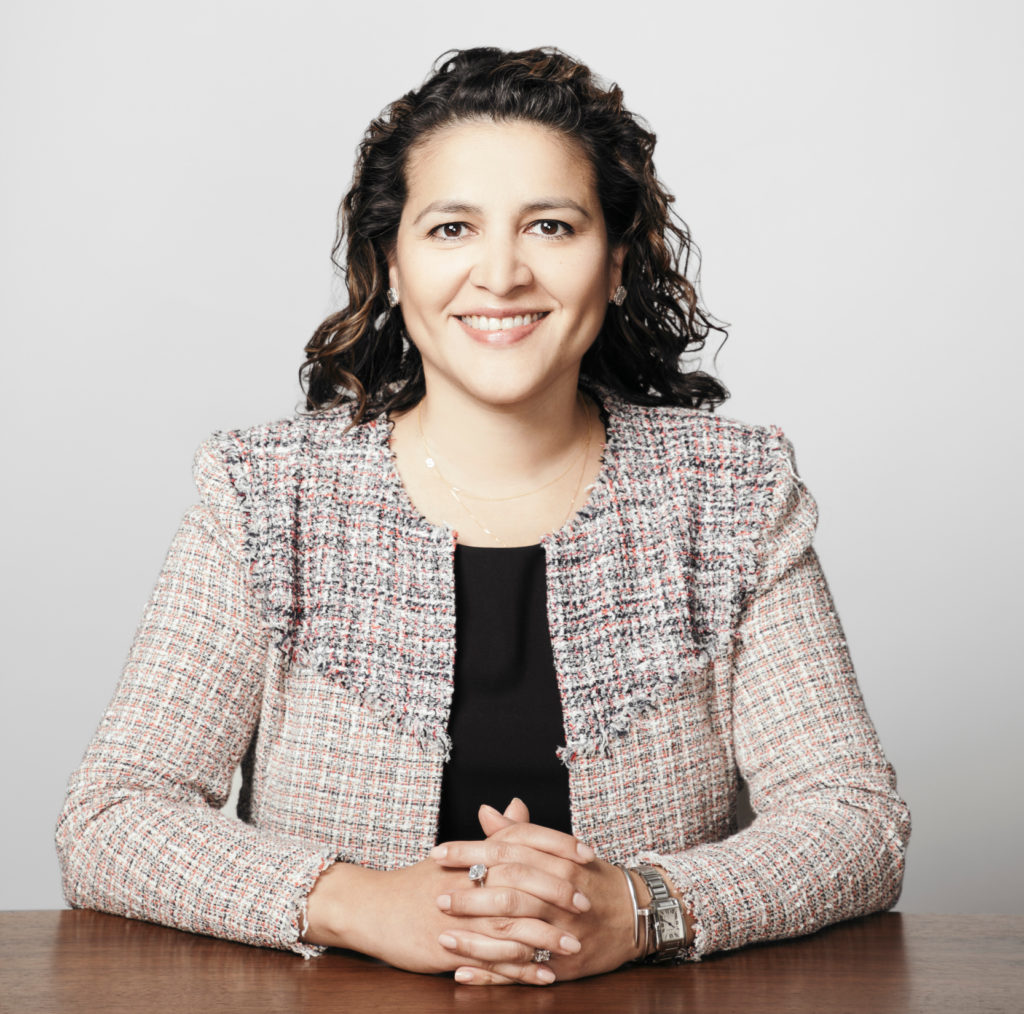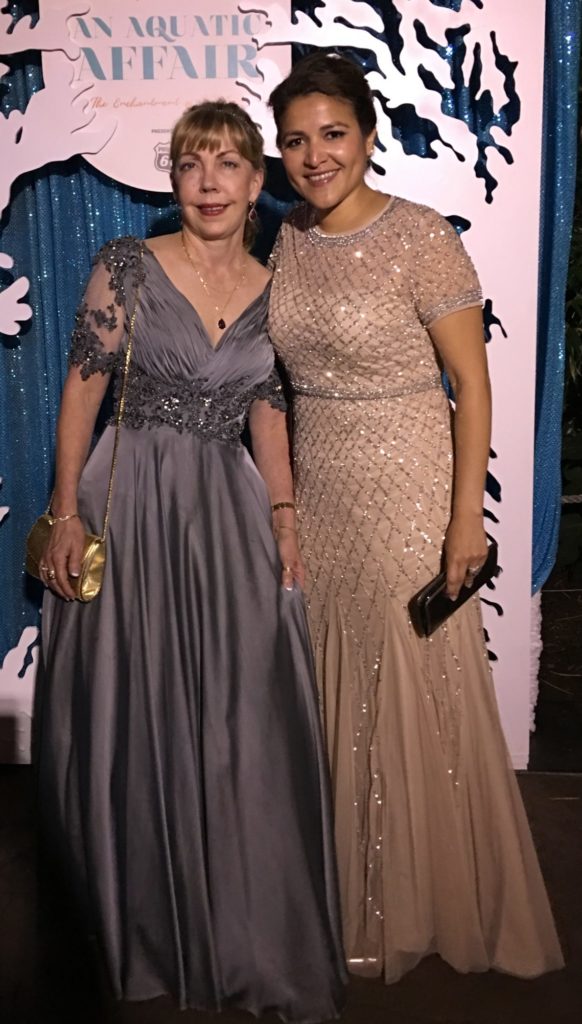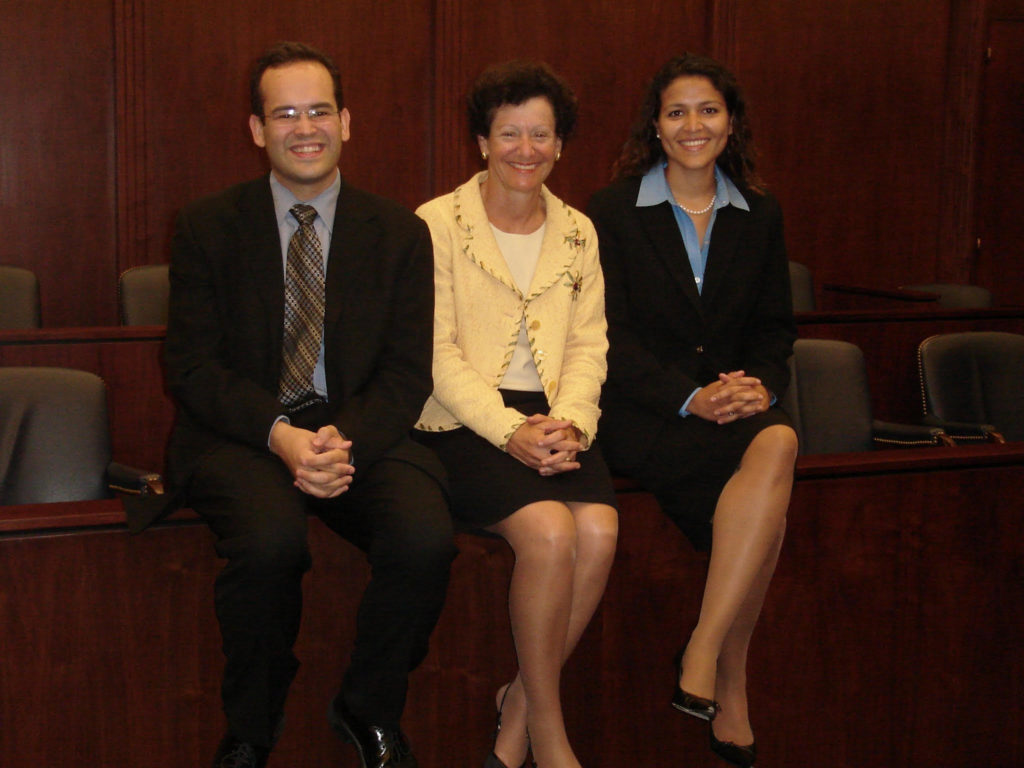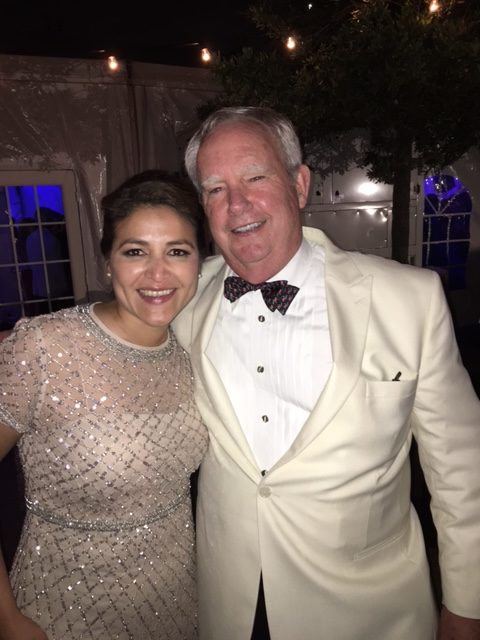
Roxanne Almaraz’s parents say their daughter made it clear to them that she was going to take one of two career paths: a lawyer or a cardiothoracic surgeon. Nothing else, they say, interested her at all.
Of course, she was only four when she made this proclamation, but she never wavered.
“At age four, I’m pretty sure I thought a career in law meant making compelling courtroom arguments that caused jurors to weep, after which whatever client I was then representing would get whatever verdict he or she had hoped for,” Almaraz told The Texas Lawbook in an interview. “And then we’d meet in the middle of the courtroom for a big hug.
“My career has never looked quite like that, obviously, but for whatever reason law is the path that stuck,” she said.
Now 39, Almaraz is unquestionably one of Houston’s premier corporate lawyers.
For more than a dozen years, she handled some of the largest and most complex energy deals in Texas – transactions that combined have a price tag in the billions.
Last year, Almaraz became the general counsel of Houston-based Arnold Ventures, a multibillion-dollar philanthropic and public policy-oriented limited liability corporation that focuses on issues from criminal justice reform and outrageous prescription drug prices to improving medical and scientific research and protecting reproductive rights.

“Roxanne is one of the truly brilliant corporate lawyers and leaders of her generation,” said Robin Fredrickson, a corporate partner at Latham & Watkins who has worked with Almaraz on multiple projects. “While she is super focused at work, she is one of the funniest, most enjoyable people to be around.
“Roxanne’s future is limitless,” Fredrickson said.
Shaping the future, according to Almaraz, is why she made the leap from handling energy mergers and acquisitions at three prominent corporate law firms – Vinson & Elkins, Bracewell and King & Spalding – to being the top lawyer at one of the nation’s leading philanthropy-focused investment operations.
“I can unequivocally say that I wasn’t looking to go in-house,” she said. “Business was good at K&S, and I felt very integrated into the broader firm, notwithstanding its non-Houston roots.
“That said, I’d had a calling for some time to do something personally meaningful,” said Almaraz, who also serves on the board of directors for the Houston Zoo, Houston Parks and the Discovery Green Conservancy. “That is not to say that leading appreciative for-profit clients through complex transactions isn’t meaningful – it is, but not in the same way that it is meaningful to spend each day in a mission-driven organization whose work is exclusively in furtherance of transformational policy change.”
Born and raised in San Antonio, Almaraz and her older brother, Frank, were the first in their family to go to college. He is now the chief administrative and business development officer at CPS Energy in San Antonio.
Her father served in the U.S. Army during the Korean War and then worked for decades in the aircraft engine shop at Kelly Air Force Base, where he drafted aircraft maintenance manuals for the Air Force. Her mother worked as a Texas child support officer, where she “performed over and over again the stressful task of locating and holding accountable parents that were past due on child support obligations,” Almaraz said.
Almaraz said she had no lawyers in her family – “although my father has watched enough daytime courtroom TV in his lifetime to sometimes imagine he earned his J.D.”
A journalism major at the University of Texas, Almaraz had her heart set on going to law school at Harvard University. But she somehow ended up at Stanford Law School.
“Honestly? A free plane ticket,” she said. “At the time of my admission, Stanford had a program where it would fly admitted students to California to get to know fellow students, the campus and so on.”
Almaraz had a close high school friend living in the Bay Area who picked her up at the airport and gave her a tour of San Francisco and Napa Valley.
“Then he drove me down the perfectly manicured palm tree-lined road that leads to the Stanford campus, where I met the happiest, least cutthroat, most well-rounded set of future legal scholars I could have ever hoped to meet,” she said. “It was 70 degrees and sunny. The rest is history.”
After graduating in 2005 from Stanford, she did a one-year clerkship with U.S. District Judge Barbara Lynn of the Northern District of Texas. The decision-making process Almaraz went through in seeking the clerkship with Judge Lynn, according to friends and colleagues, “is pure Roxanne Almaraz.”

Almaraz with her co-clerk Anthony Garza and Judge Barbara Lynn
“After three glorious years in sunny Palo Alto, I was ready to come home to Texas,” she said. “Using some combination of rudimentary internet searches and printed materials in my law school career services office, I was able to narrow down my list of targeted judges based upon geographic location, reputation for fairness and precision, and my general assessment of intellect and sense of humor – to the extent one can really discern such things from the internet and alumni commentary.”
“Judge Lynn emerged as a clear No. 1 choice for me, so when I received that ‘exploding offer’ to work as her judicial clerk, it took me no time at all to accept,” she said. “Judge Lynn is extremely demanding, requiring each clerk, staff member and counsel within her wingspan to bring her ‘A’ game.”
Having been through the summer associate program at V&E, Almaraz chose the Houston-based law firm to start her career. At first, she was torn between a litigation and transactional practice.
“My biggest reservation about a transactional practice was my inability at that time to translate the broad concept of corporate legal work into a picture of my day-to-day professional life,” she said. “With the benefit of hindsight, a transactional practice should have been a no-brainer for me.”
“I believe I am particularly well-suited to help clients come up with creative, bespoke paths to business solutions, as opposed to weighing in primarily when something has gone seriously off the rails,” she said.
It didn’t hurt that Almaraz was trained and mentored by a handful of elite M&A lawyers who were then at V&E, including Fredrickson and now-retired Greenhill investment banker and V&E managing partner Joe Dilg.

“Joe Dilg taught me so much about being a lawyer, and Robin taught me important lessons about commercial reasonableness and responsiveness to clients,” she said.
After just a few months on the job at V&E, the firm made Almaraz part of the team that represented private equity firms TPG Capital and Kohlberg Kravis Roberts, also known as KKR, in their $45 billion leveraged buyout of TXU Energy.
“We associates were working 20 hour days on that transaction,” she said. “We took turns going back to the hotel in Dallas, sleeping for a few hours, showering and then back to work. In terms of deal experience, it was incredible.”
Almaraz practiced at V&E for seven years, working on several electric power deals with partners Doug Bland and Trina Chandler. In 2013, she moved to Bracewell and then to King & Spalding in 2017.
“In each case, there was an opportunity to build something,” she said. “Bracewell had succeeded in building a world-class finance and upstream oil and gas practices, but had not directed as much of its attention to the growth of its private M&A capabilities, particularly in the areas of electric power and midstream.”
“A similar opportunity presented itself years later, when a group of some of the top-producing energy and corporate practitioners from Bracewell and Andrews Kurth banded together and decided to join K&S,” she said. “Leaving Bracewell was a very difficult decision to make. Bracewell was an overwhelmingly inclusive place.”
During Almaraz’s 13 years as a dealmaker, she was involved in several major transactions.
In 2016, she represented GE Energy Financial Services and its co-investor in the $1.89 billion sale of SourceGas, a local gas distribution company with operations across four states, to Black Hills Corp.
“The multiple state approvals required to get this deal done required a full-fledged juggling act,” she said. “My in-house client, [GE Capital managing director and counsel] Brandy Copley, was a dream partner and, at the end of the day, the client was happy, the counterparty was happy and the end consumers in affected states were well-served.”
Almaraz and King & Spalding partner Stuart Zisman in 2017 represented Noble Midstream in connection with its joint venture with Plains All American Pipeline in the $133 million acquisition of the Advantage Pipeline.
“This deal was a quintessential exercise in collaboration, both internally within the K&S team, but also with the other law firms and stakeholders involved in the transaction,” she said. “This deal could have been a potential disaster if anything had gone wrong or if every person involved had not done their role. Some extremely bright minds weighed in along the way, and it was a decided success when all of the pieces came together.”
Ashley Tufts, senior counsel at Houston-based Talen Energy, worked with Almaraz on multiple transactions.
“Roxanne is one of those lawyers who is very good with the technical aspects but also understands the commercial aspects about what it takes to get the deal done,” Tufts said. “It makes sense that Roxanne went in-house because she thinks critically about issues and is constantly asking why things are happening. Those skills are innate within her.”

Ashley Tufts and Almaraz at a Houston Astros ALCS game
Fredrickson agrees.
“Roxanne is very task-focused,” she said. “When I gave Roxanne a task, she would write down every word. Then, she would stare at me for a while and then ask a question. She is very direct, which goes very well when working with me.”
Decision to go in-house
In early 2019, a fellow Houston Zoo board member and Becks Prime Equities President Molly Voorhees introduced Almaraz to a friend, Arnold Ventures President Kelli Rhee. All three had gone to graduate school at Stanford. Rhee mentioned that their general counsel had left a couple of months earlier.
Although Almaraz had never represented Arnold Ventures in private practice, she was familiar with the work of Laura and John Arnold.
“It wasn’t structured as a job interview or anything like that,” Almaraz said. “I mostly viewed it as a chance to gain insight into how major philanthropic organizations are structured, and I assumed that Kelli was meeting with me to gain insight into what ‘type’ of lawyer – tax, transactional, litigator – might be the right fit for AV going forward.”
“So, when I found myself across the lunch table from [Rhee], listening to her describe AV’s mission to maximize opportunity and minimize injustice, seeing the word pictures she drew of a venture capital shop with the resources to effect change at scale, I was instantly intrigued,” she said. “Minutes into the conversation, I knew this was exciting work that really interested me.
“While I very much enjoyed being a law firm partner, it would be an absolute dream to have the opportunity to more directly impact positive change without sacrificing a sophisticated practice.”
Only a few weeks later, Almaraz’s wife gave birth “very prematurely” to twin girls. Almaraz focused intensely on her children and her spouse for several weeks, not giving thought to the AV GC job.
Arnold Ventures waited and Almaraz joined AV last April as it was transitioning from a traditional private foundation model to a more nimble limited liability corporation/private foundation hybrid structure.
“I joined AV right smack in the middle of a mega-structural organizational change,” she said. “To date, my team and I have successfully navigated through significant legal complexities inherent in this new advocacy-charged structure – campaign finance, government ethical rules and lobbying disclosure regulations, for example.”
“Going in-house has been a steep learning curve on issues such as insurance policies,” she said. “Due in large part to the support and patience of my incredible legal team and my superstar CFO, the transition has been surprisingly smooth, thankfully.”
Becoming a GC, she agreed, has its benefits.
“If I never see another time sheet again, it’ll be too soon,” she said. “The biggest difference is being able to truly focus my attention on a single client. In the heat of any given transaction, my attention might be focused on one particular client, but almost always with a shorter-term goal in mind.”
Almaraz said going in-house from a law firm requires “a fundamental shift in thinking” to be focused on a specific matter today “in anticipation of what the next handful of years might hold.”
“Being a GC also enables me to understand, and weigh in on, broader organizational strategy sooner than was the case as a law firm partner,” she said. “Being a GC enables me to fill the bulk of my daily plate with the part of practice that I most enjoyed during my time as a law firm partner – being a trusted counselor to fast-moving, incredibly intelligent folks who simply want a partner with whom they can bounce around a few ideas, even if those ideas don’t strictly relate to any particular legal concern or action item.”
But Fredrickson said that people should not let Almaraz’s focus at work deceive them about her ability to have fun, pointing out that she is the founder of a Houston wine club.
“Roxanne and I went to Rio de Janeiro for an energy deal, and all the locals thought she was Brazilian and were speaking to her in Portuguese,” Fredrickson said. “We even went up to see the ‘Big Jesus’ together. Crazy experience.”
“I can’t believe Robin and I actually rode that scary little tram up a mountain to it,” said Almaraz, referring to Christ the Redeemer statue. “I have been blessed to have amazing mentors like Robin in my life.”

